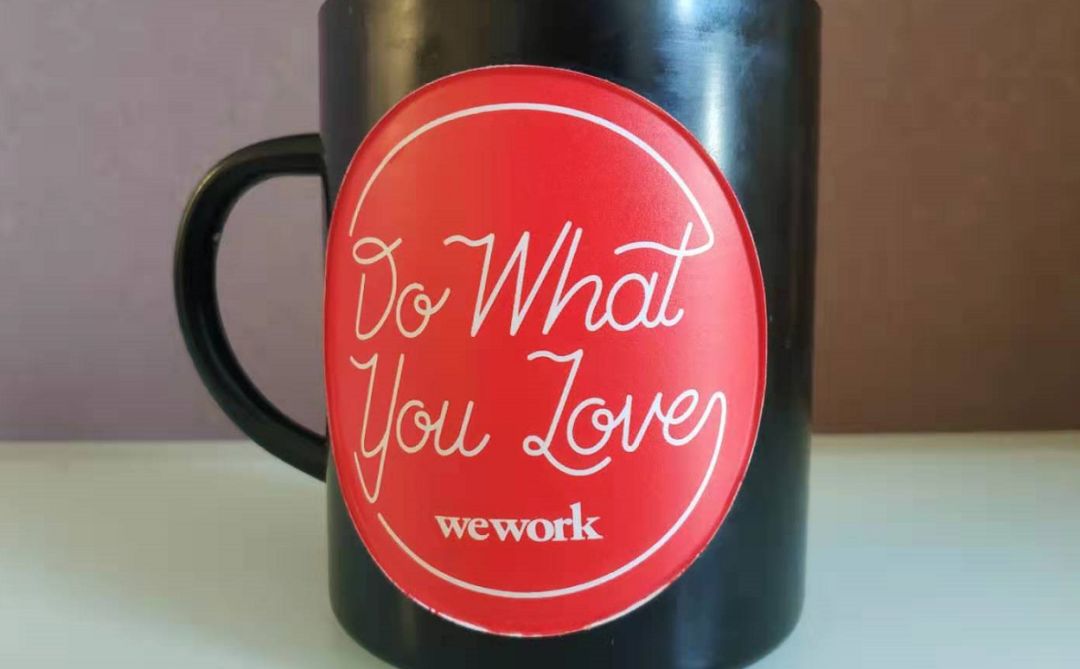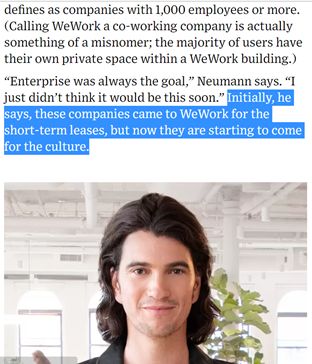WeWork always has a capability that makes people think it will be the exception
Editor’s note: This article is from WeChat public account “Airline Agency” (ID: lifeissohappy), author book.
These days, I was confused, why WeWork encountered difficulties at this time node and was denied.
The domestic shared office, maker space, incubator, accelerator and other fields have experienced a survival crisis more than a year earlier than WeWork, which is also because they are relatively more chaotic and uncompetitive.
In the past, various “shared offices” supported by the public or government have been listed in major office buildings, universities and development zones. At the height of this kind of entrepreneurial wave, other “selling water” businesses have emerged, such as office chairs, green plants and even pets and dogs.
The various shared office services in China can basically be attributed to being a “second homeowner” with neither core competitiveness nor visibility. In the face of recession, with the collapse of a large number of startup companies, these supporting businesses will also shrink and die.
But WeWork always has a power that makes people think it will be the exception.
I used to think: In the field of shared office space, if other people do not do well, it may still be their own problems; if WeWork can’t do it, then it can blame the whole industry.
The actual situation is completely different from what I have always thought. A lot of reports, such as The Verge, The Wall Street Journal, and so on, are the founders of the Adam Neumann family who are trying to maintain a sleek surface. This company can’t use it to decorate the luxurious office appearance, and often hold cocktail parties, Halloween nights, internal viewing and other activities to build a “core competitiveness” that domestic counterparts have been eager to seek.
But the problem is that we have already experienced Theranos – and looking beyond the venture capital circle, there is a Madoff Ponzi scheme that makes the set people feel ashamed. If WeWork really has such a big problem as the current report says, why I — and many others — didn’t see it for the first time? Or, we may see it, but we have no firm belief to singWhat?
Many reports can’t answer this question, but instead make me look like a fool who can’t find the elephant in the room. Until I started looking at the WeWork article before the IPO attempt.
Open a manuscript of the British version of “Connected” on June 6, 2018, which is a very standard expedition-style article written in the form of “positive reporting” and also by all of us at the time. Look at the feeling of WeWork.
https://www.wired.co.uk/article/we-work-startup-valuation-adam-neumann-interview
In the process of watching, I expressed–it’s not the stupidest one, and suddenly—we have now forgotten WeWork It’s our sensation, and it’s this feeling that made people in the past have no doubt about its illusory valuation, and now it’s a promise of nothing.
It’s like if someone is not in love, you will hate why you blinked at the beginning. If you invest money or interest in a start-up company that is later stripped of the light and reveals the true color of the “painted skin”, there will probably be similar confession.
For WeWork, the “skinning” process it is now undergoing is actually judging WeWork’s real estate business with traditional vacancy rates, cash flow, lease terms, and payments. This is forcing an art scholastic student to take a cultural lesson—comparing to what it is actually not good at, and comparing it to others (its largest opponent IWG mentioned in its prospectus).
You can’t say that this is unfair to it. Who wants it to go public? The ugliest photo of a person may be on the identity card of ta. The most ugly look of a mobile phone is to be found on the website of the Ministry of Industry and Information Technology. The IPO is even more of a “public execution” scene that strips off all clothes and removes all makeup.
You can’t imagine a traditional real estate company that has become as attractive as WeWork after making a fine renovation of the office (look at the Soho3Q and Yokohama workshops produced by real estate developers). It’s like every city that says to copy Silicon Valley (including Zhongguancun) or rebuild Hong Kong, and finally can only do it back to themselves.
The truth is that only WeWork has both a founder who is full of fairy tales, a policy that doesn’t pay attention to return on investment, and an operating rule that doesn’t follow the rules. The combination of operations can maintain this realistic distortion of position. In China, WeWork’s foreign company identity is even more like Brahmin’s gold.Expensive, other domestic entrepreneurs are difficult to easily reach.
In other words, WeWork has long been not offering desks and conference rooms, it sells atmosphere, satisfaction and a sense of participation in the grand historical process.
Neuman told Wired that the first companies came to WeWork for short-term leases, but now they are starting to come here for culture.
WeWork’s model is to divide a large office into small units after being bought or rented, and with the administrative services of fine decoration and standardization. This means that the customers who started out are from individuals or smaller companies, and subsequent large companies are stationed in small teams to enter and even settle on a larger scale.
But smaller companies, than those traditional office tenants (such as big ones), should they pay cheaper or more expensive rents?
If it is a decoration like WeWork, it is definitely a desire to rent a higher unit price. However, in the early days, they were targeted at individuals or small teams, and they were scattered for the rental of separate stations. This is like the small package that is now sold in supermarkets. Although the price per unit is higher, the amount of packaging is small, and the total price is still affordable.
The point is that WeWork’s values give buyers a reason to pay a higher price justifiably, as if we don’t have the money to buy a luxury bag, but the same brand of lipstick can always be bought.
Yes, WeWork is a luxury of technology. A WeWork station may be as good as or even worse than Starbucks and the “shared study room” (such as noisy like a cafe; no encryption using public WiFi, etc.), but this is where you enter A “lipstick” for the threshold of luxury entry.
Silicon Valley has many of these gadgets, such as Theranos (which claims to use a drop of blood to test for genetic diseases), Juicero (compressed juice in ordinary foil packaging, pretending to be extracted with special equipment), batter-like meal replacement, drink Dew, distilled water or oil. These things constitute a high-tech belief in a mirage-like, “heart and soul.”
I once wrote at the beginning of Apple Watch Edition’s attempt to enter the luxury watch field. Silicon Valley newcomers want to rewrite the rules of the game, smash the old world luxury brand, build a new, advertised love nature, simple A lifestyle that is passionate and curious (although it is often not the case).
https://zhuanlan.zhihu.com/p/19845764
WeWork first tried to say that it was a “technology company” rather than a second landlord. Since then, by reorganizing the We Company’s unified brand, it has revealed the metaphor of selling lifestyles and extended it to renting houses and running schools. I want to honestly sell the office IWG does not know how to play this game, nor intend to play this.
WeWork was born in a period of not only after the 2008 economic crisis, but also when large-scale offices and office buildings were difficult to rent. It was also the beginning of Internet entrepreneurship, which led to a period of demand for office space to pick up from the bottom. So, at that time its business model was established.
Moreover, only by comparing WeWork with ordinary real estate companies can we find that most of the new small demand at that time came from Internet startups, and they were willing to run to WeWork.
In the recovery period, everyone in the market will indeed grow, but the growth rate and benefit range are different. Among these new additions, WeWork has benefited from its “lifestyle” aura and has taken away more.
Now, the newly added shares have completely withdrawn from the tide of seawater. WeWork, which relies on this particular way of growth, is naturally the first to bear the brunt, and the original real estate companies can at least hold the original share. (Imagine the different options for bicycle manufacturers when sharing bicycles.)
After the IPO, the market and the media will be very strict, but what they are asking for is not to let all companies return to the unpretentious rustic nature. All they need is that your company can continue to make profits .
But this kind of extraordinary realm of WeWork (and a large number of companies operating in a loss-making industry in other industries) happens to be created only with a lot of money. It is also necessary to open the store unreasonably. Otherwise, it is not so aggressive, it is difficult to get the financing of Softbank.
Even to some extent, it is necessary for founder David to use tequila and private jets to maintain the attractiveness of this lifestyle. It seems that the only thing that deserves to be accused is that it is just a family business. Let investors criticize his life style with greater anger.
We must also face up to the role of the media.
Original, “Connected” is a person who is fully pilgrimage or curious and has no doubts about the creation of all the people who have been created. The first few minutes of the movie “Top Player” and the beginning of “Poison” are all satiric irony of this blind obedience and worship of the founders of technology.
Now, the tech media (or the tech media group of the financial media) is trying to do everything about them.The things that have been worshipped are reduced, and indulged in this kind of game that makes the once worshipers stunned, games full of justice. However, the predecessors of the technology media, the political and financial media, have already experienced a wave of ups and downs from party struggles, squatting, and blackening to the establishment of the “fourth power.” Now, they are advising the tech media that have just tasted the sweetness, and at the same time destroying, they must be good at building; it is not right to give a feasible solution, not to say that it is not right.
WeWork is in a bad situation right now. It has lost the sacred aura that it was trying to maintain, and it can’t stop people from measuring it with the “narrow” vision of other real estate companies. So at this time, whether it will lay off employees or stop expanding will not make much sense.
What made WeWork’s repainted office have spirituality and become a pilgrimage site for everyone, I think we should not forget now. Just like a girl who is inactive, I must remember why I fell in love with this bad guy. Negating these also denies the time that I have spent in the past, the goals I have pursued and the sincerity I have paid.
The feeling of moving and indulging in the progress of the times is especially worthy of recollection in the face of the big winter or personal adversity. People are dead, and that is indeed what we are. In a short life, there are very few moments worth pursuing and remembering.

